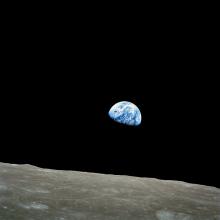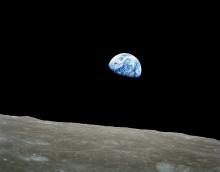Listen to today's episode of StarDate on the web the same day it airs in high-quality streaming audio without any extra ads or announcements. Choose a $8 one-month pass, or listen every day for a year for just $30.
You are here
Losing Weight
Planet Earth turns on its axis like a spinning gyroscope — one turn every 23 hours and 56 minutes. And because of that spin, you’d weigh less at the equator than at the poles.
The spin is pretty fast — a point on the equator moves at more than a thousand miles per hour. That creates an outward “push” on material at the equator. That gives Earth a slight “bulge” in its waistline — about 27 miles wider through the equator than through the poles.
Since a person standing at one of the poles is a little bit closer to the center of Earth than a person at the equator, the person at the pole would feel a stronger gravitational pull.
The difference would be magnified by Earth’s rotation. A person at the equator would be pushed outward by the same force as Earth itself. That acceleration would decrease their weight.
When you add up the effects, a person who weighs 150 pounds at the poles would weigh almost a pound less at the equator.
The same thing would happen on the other planets of the solar system, although to varying degrees. Venus has the slowest rotation, and it’s the “roundest” planet, so the difference would be tiny.
On Jupiter and Saturn, though, it would be much more pronounced. Both planets are giant balls of gas, and they both spin much faster than Earth does. As a result, they’re much more “squashed” than Earth is. So if you floated through the clouds at the poles, you’d weigh many pounds more than at the equator.
Script by Damond Benningfield





